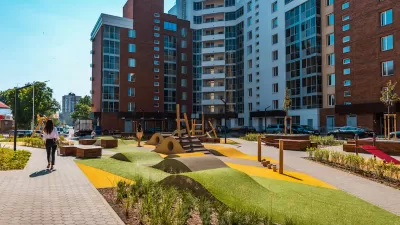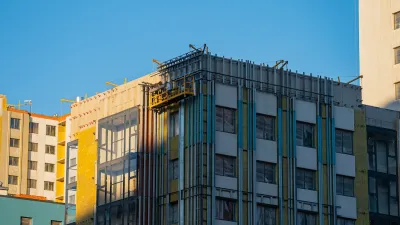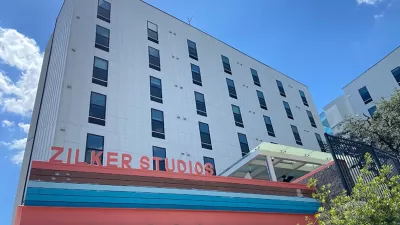A research program at Auburn University in Alabama seeks to go national, but experience from the program’s evolution means a cautious move forward.
The 20K Home is a research program to teach Auburn University students about designing and building affordable housing. It began 13 years ago as part of a field study program, Rural Studio, when students were tasked with building a home for $20,000, with $12,000 going to materials and $8,000 to labor and profit.
Since then, almost 30 homes have been completed, but things have changed over time—a doubling of the cost of materials, for one. An expansion of the program, the 20K Initiative, has also highlighted the many challenges of affordable housing beyond design and architecture. “Today, the 20K Initiative has shifted the discussion from the cost of a home to the cost of homeownership, from purchase to post-occupancy maintenance,” reports Lucy Wang.
The 20K Initiative recognizes that affordability is less about homeowners’ ability to cover the monthly mortgage and more about unanticipated challenges: fluctuating energy costs, unexpected maintenance, or loss of a job or income. The program is now focused on fostering the long-term sustainability of affordable homeownership. Past lessons and insight are informing the project’s next steps, with plans for the release of a 20K Product Line next year to make the homes and related research widely available.
FULL STORY: Rural Studio’s 20K Homes Reveal the Systemic Problems Behind Affordable Housing

Maui's Vacation Rental Debate Turns Ugly
Verbal attacks, misinformation campaigns and fistfights plague a high-stakes debate to convert thousands of vacation rentals into long-term housing.

Planetizen Federal Action Tracker
A weekly monitor of how Trump’s orders and actions are impacting planners and planning in America.

In Urban Planning, AI Prompting Could be the New Design Thinking
Creativity has long been key to great urban design. What if we see AI as our new creative partner?

How Trump's HUD Budget Proposal Would Harm Homelessness Response
Experts say the change to the HUD budget would make it more difficult to identify people who are homeless and connect them with services, and to prevent homelessness.

The Vast Potential of the Right-of-Way
One writer argues that the space between two building faces is the most important element of the built environment.

Florida Seniors Face Rising Homelessness Risk
High housing costs are pushing more seniors, many of them on a fixed income, into homelessness.
Urban Design for Planners 1: Software Tools
This six-course series explores essential urban design concepts using open source software and equips planners with the tools they need to participate fully in the urban design process.
Planning for Universal Design
Learn the tools for implementing Universal Design in planning regulations.
Gallatin County Department of Planning & Community Development
Heyer Gruel & Associates PA
JM Goldson LLC
City of Camden Redevelopment Agency
City of Astoria
Transportation Research & Education Center (TREC) at Portland State University
Jefferson Parish Government
Camden Redevelopment Agency
City of Claremont





























